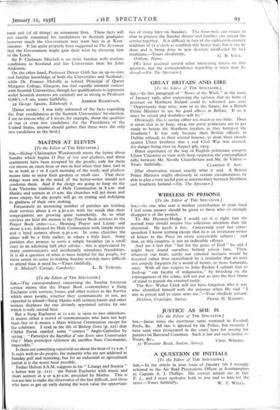. [To. the Editor of THE SPECTATOR.] - Six, — The correspondence
concerning the Sunday forenoon service shows that the Prayer Book contemplates a Sung Eucharist with sermon, banns, and other notices as the Service which most people, whether they communicate or not, are expected to attend—Sung Matins with sermon, banns and other notices displaces the one divinely appointed service by one which is only second best.
But a Sung Eucharist at 11 a.m. is open to two objections. It means either a crowd of communicants who have not kept their. fast or .it means a Mass without Communion except for the celebrant. .1 read in the life of Bishop Gore (p. 221) that l'Abbe Portal startled some " correct " Anglo-Catholics by saying : " Participer du Sacrifice d' une Sorte sans Communier Oui ! Mais participer reelement du sacrifice Sans Communier, impossible."
Is there not something superstitious about the hour of r r a.m. ? It suits well-to-do people, the minority who are not addicted to Sunday golf and motoring, but for an industrial or agricultural parish it is the worst hour possible.
Father Hebert S.S.M. suggests in his " Liturgy and Society " a better way (p. 211) : the Parish Eucharist with music and short sermon at 9 or 9.3o a.m. preceded by Matins. This is nottoo late to.make the observance of the fast difficult, and those who have to get up early during the week value the opportuni- ties of rising later on Sundays. The housewife can return in time to prepare the Sunday dinner and families can attend the service together. It is difficult in face of the eighteenth-century tradition of t I o'clock to establish this better way, but it can be done and is being done in new districts unaffected by bad
traditions.—Yours obediently, Odiham, Hants.
G. B. VAUX.
[We have received several other interesting letters on this question, but the correspondence regarding it must now b. closed.—En. The Spectator.]














































 Previous page
Previous page